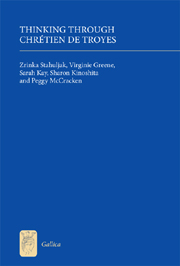Book contents
- Frontmatter
- Contents
- Preface
- Introduction
- 1 The “Changeful Pen”: Paradox, Logical Time, and Poetic Spectrality in the Poems Attributed to Chrétien de Troyes
- 2 Imagination
- 3 Adventures in Wonderland: Between Experience and Knowledge
- 4 Feudal Agency and Female Subjectivity
- 5 Forgetting to Conclude
- Epilogue
- Appendix I Sigla of the Principal Manuscripts of the Chrétien Romances
- Appendix II Lyric Texts, Textual Notes and Translations
- Appendix III Passages from Cligés for Comparison with Lyric Texts
- Appendix IV Variants to the “Cart Scene” in Le Chevalier de la Charrete
- Bibliography
- Index
- Title in the Series
3 - Adventures in Wonderland: Between Experience and Knowledge
Published online by Cambridge University Press: 05 February 2013
- Frontmatter
- Contents
- Preface
- Introduction
- 1 The “Changeful Pen”: Paradox, Logical Time, and Poetic Spectrality in the Poems Attributed to Chrétien de Troyes
- 2 Imagination
- 3 Adventures in Wonderland: Between Experience and Knowledge
- 4 Feudal Agency and Female Subjectivity
- 5 Forgetting to Conclude
- Epilogue
- Appendix I Sigla of the Principal Manuscripts of the Chrétien Romances
- Appendix II Lyric Texts, Textual Notes and Translations
- Appendix III Passages from Cligés for Comparison with Lyric Texts
- Appendix IV Variants to the “Cart Scene” in Le Chevalier de la Charrete
- Bibliography
- Index
- Title in the Series
Summary
The responses of characters to marvelous events in romances may be disappointing for the reader of romances: reason is no match for situations that require omniscience. Wonders may be a rich tool to stir up the imagination and psychological engagement of the reader, but reason does not measure up to them, ultimately providing little insight into the nature of the event disrupting the everyday human order of things. In Guillaume d'Angleterre, after much ratiocination, reason yields, blindly and aimlessly, to the imperious command to go into exile; the king abandons himself and his wife to “whatever shall happen to me” (que qu'avenir m'an doive; Guillaume, l. 342). The event is presented as an adventure, “adventure leads them” (avanture les moine; Guillaume, ll. 438, 2763), and it remains through the end a wonder: the king “saw the light, heard the voice; he made a sign of the cross over his face at the wonder he felt” (Vit la clarté, oï la voiz / An mi son vis a faite croiz, / De la mervoillie que il ot; Guillaume, ll. 117–19). The narrative provides no meaningful or logical explanation of this “mervoillie,” no reason for this adventure, nor any final statement on the king's status either as hero or saint. What we are told, however, is that the experience of the “mervoillie” takes twenty-three years (Guillaume, l. 2607) to work itself out and for its four dispersed protagonists to be reunited in a series of chance encounters.
- Type
- Chapter
- Information
- Thinking Through Chrétien de Troyes , pp. 75 - 110Publisher: Boydell & BrewerPrint publication year: 2011



